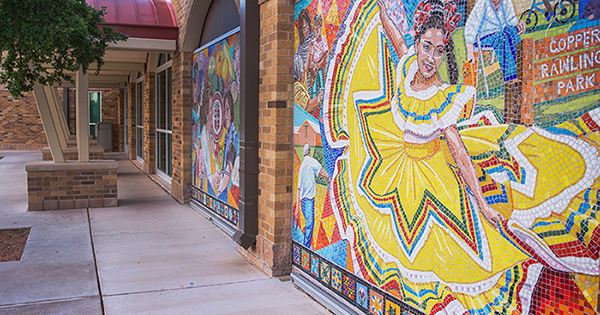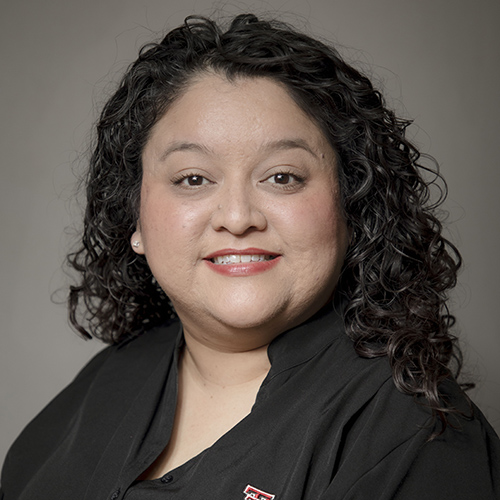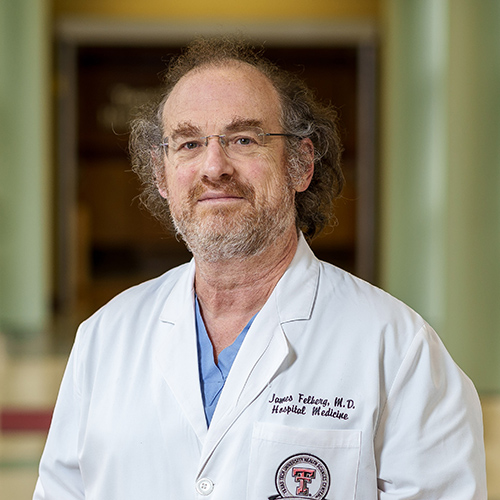HRSA Funding Will Result in Collaborative Effort Between Schools
Grant to Help Develop Community Health Worker Expansion in West Texas

Larry Combest Community Health and Wellness Center
As part of a program designed to train and add a significant number of new community health workers (CHWs) to the nation’s health care system, the Health Resources and Services Administration (HRSA), recently awarded a three-year, $2.4 million grant to the Texas Tech University Health Sciences Center (TTUHSC) School of Nursing.
Under the grant, TTUHSC will provide direct training for new CHWs in the Lubbock area and throughout the state to help support essential public health services and focus on training and employment through registered apprenticeship programs and job placements.

Monica Garcia, LMSW
Monica Garcia, LMSW, instructor for TTUHSC’s Community Health Worker program at the School of Nursing’s Larry Combest Community Health and Wellness Center (Combest Center), said HRSA started the program to increase access to health care and address public health needs for underserved communities. Under the program, HRSA, an agency of the U.S. Department of Health and Human Services, plans to train about 13,000 new and current community health workers and other health support workers across the nation. Garcia said the grant will allow TTUHSC to train and certify 135 new CHWs from across Texas.
“The School of Nursing’s Combest Center is a certified Community Health Worker training site, and Texas is one of only a few states that has a standardized process for certification for community health workers,” Garcia said. “We've been a certified training site since about 2006, so we'll be able to train folks across the State of Texas.”
Garcia said the grant is going to pay specifically for training and certifying new community health workers or other health support workers, and to provide additional training for those already certified as community health workers. That training may provide existing CHWs with additional certification.
“We may look at them receiving additional education that places an emphasis on public health essentials, oral health and transitional care coordination,” Garcia said. “The CHW will learn how they can incorporate that particular training into the services they're already delivering.”

Linda McMurry, DNP, R.N.
Linda McMurry, DNP, R.N., associate dean for clinical services and community engagement at the School of Nursing and executive director for the Combest Center, said one of the most significant aspects of the grant is the interprofessional component fostered by collaboration between the TTUHSC Schools of Nursing, Medicine and Health Professions, and the El Paso School of Dental Medicine.
“We also are developing relationships with community partners such as the City of Lubbock Health Department and South Plains Community Action Association to strengthen the workforce as well as improving care for the medically underserved populations of our communities,” McMurry said.
The training for new CHWs will emphasize the well-established core competencies for CHW certification. Meeting those core competencies means a certified CHW has sharpened their skills in communications, interpersonal skills, service coordination, capacity building, advocacy, teaching, organizing and expanding their knowledge base about specific health issues.
Jamie Felberg, M.D., assistant medical director-hospital medicine for TTUHSC’s School of Medicine, also will conduct work under the grant. He said the program will include virtual and self-paced training. Over the program’s three years, up to 40 trainees will go through a 2,000-hour apprenticeship that is basically full-time jobs for which they will receive a stipend.

Jamie Felberg, M.D.
Felberg said community health workers go by many different titles such as promotor(a), outreach worker, navigator, health advisor and community health representative. One of their primary objectives is to build trust and relationships within the community so that patients will see them as a reliable and often proactive health care resource.
“That community could be any community you define, whether it be based upon socioeconomics, religion or really anything,” Felberg explained. “A community health worker is a member of a community that acts as a liaison between the health care system and the community. It's a link, and a very crucial link for the community to access health care system.”
As a generalist, Felberg works with hospitals, clinics and physicians with many different specialties. He said community health workers can be trained to help patients facing almost any challenge.
For instance, a CHW may have a patient whose struggles with blood pressure and diabetes often lands them in the emergency room. The CHW will discuss with the patient ways to improve the patient’s lifestyle choices. CHWs also help patients find primary care physicians, help them make and get to an appointment and otherwise navigate the health care system.
“Community health workers act basically like an advocate within the community, and they act at the level of the home and the region in which they live to connect patients with the resources they need,” Felberg added.
Garcia agreed, and said whether it’s getting patients to the resources they need, or getting the resources to the patient, building trust between the patient and the health care system is key.
“Whatever it takes to help the patient so they get the resource, the education and the overall support they need, and in order to even make a dent in that, you have to build trust,” Garcia said. “Whether a community health worker is working with an individual or within a group or a community as a whole, that trust is really important.”
Garcia has started organizing and planning the training program, which will eventually include a website for those interested in applying for the program. She said applicants should be at least 18 years old and have established Texas residency. They also must be high school graduates and have no felonies.
“Once we've got all of our dates and strategic goals in place, we'll make that announcement,” Garcia said. “Anyone interested will be able to visit our website to access additional information and the application process.”
Related Stories
TTUHSC Receives $1 Million Gift from Amarillo National Bank to Expand and Enhance Pediatric Care in the Panhandle
TTUHSC School of Medicine leaders accepted a $1 million philanthropic gift from Amarillo National Bank on Tuesday (Feb. 10), marking a transformational investment in pediatric care for the Texas Panhandle.
Texas Tech University Health Sciences Center Permian Basin Announces Pediatric Residency Program Gift
TTUHSC Permian Basin, along with the Permian Strategic Partnership and the Scharbauer Foundation, Feb. 5 announced a gift that will fund a new pediatric residency.
The Ph.D. Programs that Shape Health Care
The Graduate School of Biomedical Sciences Ph.D. programs at TTUHSC provide the foundation, mentorship and research opportunities you need to pursue groundbreaking work.
Recent Stories
National Academy of Inventors Names TTUHSC Faculty Senior Members
The National Academy of Inventors (NAI) has designated two current and one former TTUHSC faculty researchers as Senior Members.
The John Wayne Cancer Foundation Surgical Oncology Fellowship Program at Texas Tech University Health Sciences Center Announced
TTUHSC is collaborating with the John Wayne Cancer Foundation and has established the Big Cure Endowment, which supports the university’s efforts to reduce cancer incidence and increase survivability of people in rural and underserved areas.
TTUHSC Receives $1 Million Gift from Amarillo National Bank to Expand and Enhance Pediatric Care in the Panhandle
TTUHSC School of Medicine leaders accepted a $1 million philanthropic gift from Amarillo National Bank on Tuesday (Feb. 10), marking a transformational investment in pediatric care for the Texas Panhandle.
